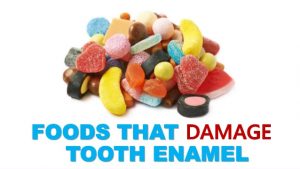Acidic foods are known to attack teeth. Caries is mainly due to the acids produced from sugars and starches by bacteria located in dental plaques. The combination of these two seems to be particularly at risk for cavities. To find you smile, must concern to your dentist as well. We have best prosthodontist in San Diego, who can help you in best manner. Dentistry makes the difference between the carious defect of the tooth and the non-carious one. Dentists are increasingly observing tooth wear, not only among the elderly, but also among the young. In the latter, the number one culprit for a tooth defect is the consumption of caries-promoting foods (cariogenic). However, cavities can be prevented with the right choice of food and good dental hygiene.
How do cavities occur?
The oral cavity constantly contains certain microorganisms (bacteria and fungi) in a completely normal manner. On the other hand, an insufficient dental hygiene makes that the teeth are covered with a sticky and tenacious coating, dental plaque, true sanctuary for certain bacteria. The bacteria in these plates eat mostly carbohydrates – especially sugars and starchy foods – from leftover food. These are transformed in a matter of minutes into acids. Acids lower the pH on the surface of the teeth and thus cause their destruction (this phenomenon is called demineralization). This results in the appearance of a cavity, visible on the tooth first through a lighter area, then through a real hole.

Cariogenic foods
Certain foods are well known to dentists to be cariogenic, that is to say, to promote cavities. Sugar is a typically cariogenic food, regardless of its composition. Indeed, whether it is industrial table sugar (sucrose) or “ natural ” sugars such as fructose, galactose (milk sugar) or dextrose (grape sugar), they are all transformed into acids by dental plaque bacteria. The sugar substitutes (for example xylitol) that are found, among other things, in “sugar-free” chewing gum seem to have a protective effect against cavities. Scientific studies have shown that bacteria can hardly transform xylitol into acids, making this product harmless to the teeth.
Experts say the risk of cavities depends on the amount and frequency of sugar consumption. To keep your teeth healthy, you must therefore pay attention to the percentage of sugar in industrial food products, reduce consumption to a minimum and avoid sweetening yourself. It also includes natural sweet supplements such as maple syrup, honey, etc. These substances are no less cariogenic than sugar.
The prolonged presence of a food in the mouth (for example candies) as well as a sticky consistency (for example bananas) are also factors favoring cavities. Bread and potato crisps are in themselves not very cariogenic. Researchers have shown, through analysis of the pH in the mouth, that the consumption of these foods causes a lower pH than a longer time than that of sugar, but this result was due to the fact that they had tested the combination of more starchy sugars, such as in, cakes and cookies.
How to protect yourself?
Researchers recommend avoiding sweets – including foods containing sugar or starchy foods – or at worst consuming them during one of three daily meals. Indeed, their consumption mixed with a normal meal lowers the pH less, the acids then being neutralized more quickly. For example, a study has shown that eating cheese can relatively quickly neutralize the pH after a mouthwash containing sugar. The reason is that cheese increases saliva production on the one hand and is rich in protein, calcium and phosphate on the other hand, which helps neutralize acids. It is favorable to replace sugary snacks with vegetables, nuts or unsweetened beverages. A study has shown that preschoolers are much less likely to get cavities if they eat more vegetables between meals.
Another possibility to strengthen tooth enamel is to consume calcium-rich products. The latter is necessary for mineralization (strengthening) of bones and teeth. It is found among others in dairy products. Products containing bifidobacteria and lactobacilli are preferable. These natural bacteria fight the “ bad ” bacteria and neutralize the oral flora.
Click Here: https://versaillesdentalclinic.com/services/root-canal-treatment-dubai/
 Bloggers Trend Keeping You Up To Date
Bloggers Trend Keeping You Up To Date
